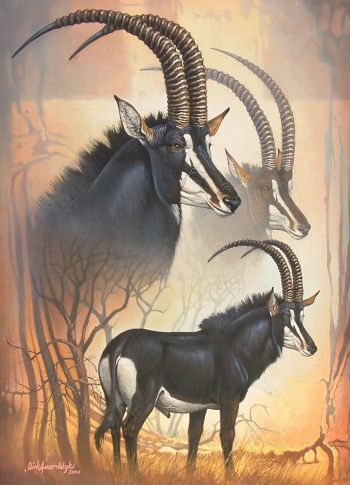Difference between revisions of "Sable Antelope"
Tao alexis (talk | contribs) |
Tao alexis (talk | contribs) |
||
| Line 20: | Line 20: | ||
Sable antelope are large hoofed [[Mammal|mammals]] whose range extends from southern Africe to the Indian Subcontinent; they are often confused with the [[Bluebuck Antelope|bluebuck]], which looks similar. They prefer wooded areas throughout the savanna, but can be found in semi-deserts such as the [[Thar Desert]] or in southern [[Arabian Desert|Arabia]]. The name comes from the black colour of their dark coat; their skins are prized for use as floor coverings and [[Shield (armour)|shield]] making. | Sable antelope are large hoofed [[Mammal|mammals]] whose range extends from southern Africe to the Indian Subcontinent; they are often confused with the [[Bluebuck Antelope|bluebuck]], which looks similar. They prefer wooded areas throughout the savanna, but can be found in semi-deserts such as the [[Thar Desert]] or in southern [[Arabian Desert|Arabia]]. The name comes from the black colour of their dark coat; their skins are prized for use as floor coverings and [[Shield (armour)|shield]] making. | ||
| − | [[File:Antelope-sable.jpg| | + | [[File:Antelope-sable.jpg|left|350px|thumb]] |
== Behaviour == | == Behaviour == | ||
Ordinarily docile, the sable antelope give ground when approached, keeping a distance of 20-50 [[Combat Hex|hexes]]. They'll fight if pressed. A [[Missile Weapons|missile]] hit causes the antelope to scream, which panics the herd into a run — these creatures can reach speeds up to 35 mph. When antelope encounter predators that can outrun them, the herd tightens together to confront the threat; upon the [[Stun Lock|stunning]] or [[Death|death]] of an antelope, the others will usually withdraw, allowing the predators to have at the carcass. | Ordinarily docile, the sable antelope give ground when approached, keeping a distance of 20-50 [[Combat Hex|hexes]]. They'll fight if pressed. A [[Missile Weapons|missile]] hit causes the antelope to scream, which panics the herd into a run — these creatures can reach speeds up to 35 mph. When antelope encounter predators that can outrun them, the herd tightens together to confront the threat; upon the [[Stun Lock|stunning]] or [[Death|death]] of an antelope, the others will usually withdraw, allowing the predators to have at the carcass. | ||
Revision as of 19:25, 4 January 2022
| Species | bovine |
| No. Appearing | 4–40 |
| Behaviour | herd (loose) |
| Range | desert, steppe, woodland |
| Size | 4 ft. at shoulder |
| Weight | 510 lbs. |
| Intelligence | 1 |
| Armour Class | 7 |
| Hit Dice | 2 |
| Action Points | 8 |
| Max. Stride | 20 |
| THAC0 | 20 |
| Hp/Die | d10 |
| Attack Forms | horn butt |
| Damage | 2–8 |
| Special Attacks | charging |
Sable antelope are large hoofed mammals whose range extends from southern Africe to the Indian Subcontinent; they are often confused with the bluebuck, which looks similar. They prefer wooded areas throughout the savanna, but can be found in semi-deserts such as the Thar Desert or in southern Arabia. The name comes from the black colour of their dark coat; their skins are prized for use as floor coverings and shield making.
Behaviour
Ordinarily docile, the sable antelope give ground when approached, keeping a distance of 20-50 hexes. They'll fight if pressed. A missile hit causes the antelope to scream, which panics the herd into a run — these creatures can reach speeds up to 35 mph. When antelope encounter predators that can outrun them, the herd tightens together to confront the threat; upon the stunning or death of an antelope, the others will usually withdraw, allowing the predators to have at the carcass.
Sable antelopes rut during the late dry season, for 2-3 months — and during this time they are very aggressive. Males fight among themselves to become the lead male, but these fights rarely end in injury. During this period, the animal may charge aggressively if approached; in such cases, a hit with the horns will cause double damage.
When herds grow larger than 35 to 40 animals, cows and their young will split into two or three different groups, followed thereafter by the males. Each new group will soon be led by one adult bull, with secondary males keeping to themselves in groups of 3-12.
See Bestiary
